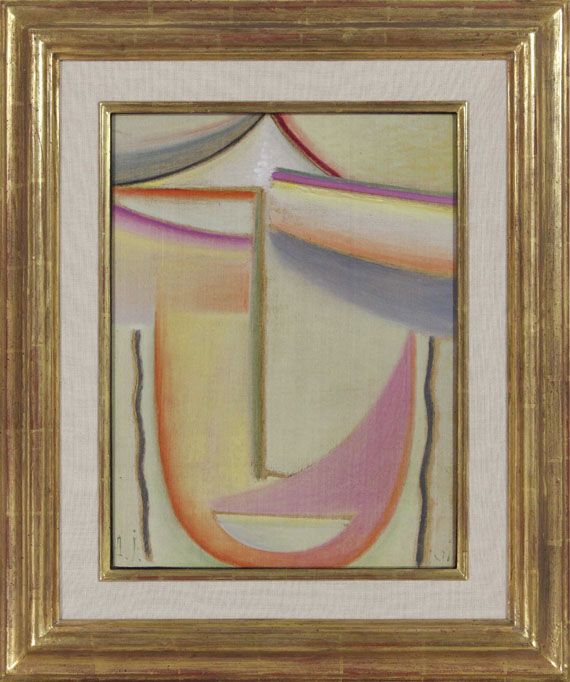109
Alexej von Jawlensky
Abstrakter Kopf (Poesie des Morgens), 1931.
Oil on board with canvas embossing
Estimate:
€ 200,000 / $ 232,000 Sold:
€ 312,500 / $ 362,500 (incl. surcharge)
Abstrakter Kopf (Poesie des Morgens). 1931.
Oil on board with canvas embossing.
Jawlensky/Pieroni-Jawlensky/Jawlensky 1371. Lower left monogrammed and dated in lower right. Verso once more signed and dated, as well as numbered "N. 71". 43 x 33 cm (16.9 x 12.9 in).
• From the work group of the large Abstract Heads.
• In soft, yet unusually strong colors.
• Notable provenances.
PROVENANCE: Dr. Marga Stegmann, Dresden (acquired from the artist in November 1934).
Dr. Hans Meyer-Benteli, Bern (from aforementioned since 1936).
Karl Ströher, Darmstadt (since 1955).
Dr. Erika Pohl-Ströher, Switzerland (from aforementioned since 1977).
Private Collection Switzerland.
EXHIBITION: Darmstadt, Hessisches Landesmuseum, Collection Karl Ströher, 2, 1965, no. 49 (with illu.).
LITERATURE: The artist’s Cahier Noir, 1931, listed as no. 71, p. 18.
Kunstkabinett R. N. Ketterer, Stuttgart, auction on November 30 and December 1, 1955, lot 1269.
Erika Pohl, Ursula Ströher and Gerhard Pohl (editors), Karl Ströher, Sammler und Sammlung, Stuttgart 1982, no. 250, with illu. on p. 286.
"I had to find a form for the face. I understood that really great art could only be made with a deeply reigious feeling. And I could only achieve that with the human face. I realized that the artist had to express his own inner divinity through form and color. That is why the artwork is a visible divinity and art the longing for God."
A. v. Jawlensky, quote after: Alexej von Jawlensky, Galerie Wittrock, 1986, p. 12.
Oil on board with canvas embossing.
Jawlensky/Pieroni-Jawlensky/Jawlensky 1371. Lower left monogrammed and dated in lower right. Verso once more signed and dated, as well as numbered "N. 71". 43 x 33 cm (16.9 x 12.9 in).
• From the work group of the large Abstract Heads.
• In soft, yet unusually strong colors.
• Notable provenances.
PROVENANCE: Dr. Marga Stegmann, Dresden (acquired from the artist in November 1934).
Dr. Hans Meyer-Benteli, Bern (from aforementioned since 1936).
Karl Ströher, Darmstadt (since 1955).
Dr. Erika Pohl-Ströher, Switzerland (from aforementioned since 1977).
Private Collection Switzerland.
EXHIBITION: Darmstadt, Hessisches Landesmuseum, Collection Karl Ströher, 2, 1965, no. 49 (with illu.).
LITERATURE: The artist’s Cahier Noir, 1931, listed as no. 71, p. 18.
Kunstkabinett R. N. Ketterer, Stuttgart, auction on November 30 and December 1, 1955, lot 1269.
Erika Pohl, Ursula Ströher and Gerhard Pohl (editors), Karl Ströher, Sammler und Sammlung, Stuttgart 1982, no. 250, with illu. on p. 286.
"I had to find a form for the face. I understood that really great art could only be made with a deeply reigious feeling. And I could only achieve that with the human face. I realized that the artist had to express his own inner divinity through form and color. That is why the artwork is a visible divinity and art the longing for God."
A. v. Jawlensky, quote after: Alexej von Jawlensky, Galerie Wittrock, 1986, p. 12.
With this striking linear composition Jawlensky created an exceptional example of the complexity of his series of the "Abstract Heads", which is considered the high point of his lifetime achievement. He confronts the observer with a face that is reduced to the essential elements, so that it becomes an archetype or even a symbol for man itself. He creates ethereous effects through the denial of spatial depth, which adds an aura of an eternal, almost supernatural peace to the facial features. In the combination of our work’s subtitle “Poesie des Morgens” (Poetry of the Morning) and its gentle yet bright coloring, it calls reminiscence of the harmonious colors of the dawn of a new day. Through the constant repetition of the same theme, the repetitive concentration on form and color, the immersion into the human face, Jawlensky explores the depths and essence of human existence. His process of creation can be compared with those of Paul Cézanne or Giorgio Morandi, who had also reduced their art to a very limited choice of motifs and geometrical forms, in order to examine the expressive values of colors in combination with a simple form. Through the principle of the series, the meditative internalization of one and the same theme, Jawlensky strives to create a link, a visual expression about the secret of life.
109
Alexej von Jawlensky
Abstrakter Kopf (Poesie des Morgens), 1931.
Oil on board with canvas embossing
Estimate:
€ 200,000 / $ 232,000 Sold:
€ 312,500 / $ 362,500 (incl. surcharge)
Headquarters
Joseph-Wild-Str. 18
81829 Munich
Phone: +49 89 55 244-0
Fax: +49 89 55 244-177
info@kettererkunst.de
Louisa von Saucken / Undine Schleifer
Holstenwall 5
20355 Hamburg
Phone: +49 40 37 49 61-0
Fax: +49 40 37 49 61-66
infohamburg@kettererkunst.de
Dr. Simone Wiechers / Nane Schlage
Fasanenstr. 70
10719 Berlin
Phone: +49 30 88 67 53-63
Fax: +49 30 88 67 56-43
infoberlin@kettererkunst.de
Cordula Lichtenberg
Gertrudenstraße 24-28
50667 Cologne
Phone: +49 221 510 908-15
infokoeln@kettererkunst.de
Hessen
Rhineland-Palatinate
Miriam Heß
Phone: +49 62 21 58 80-038
Fax: +49 62 21 58 80-595
infoheidelberg@kettererkunst.de
We will inform you in time.




 Lot 109
Lot 109 

